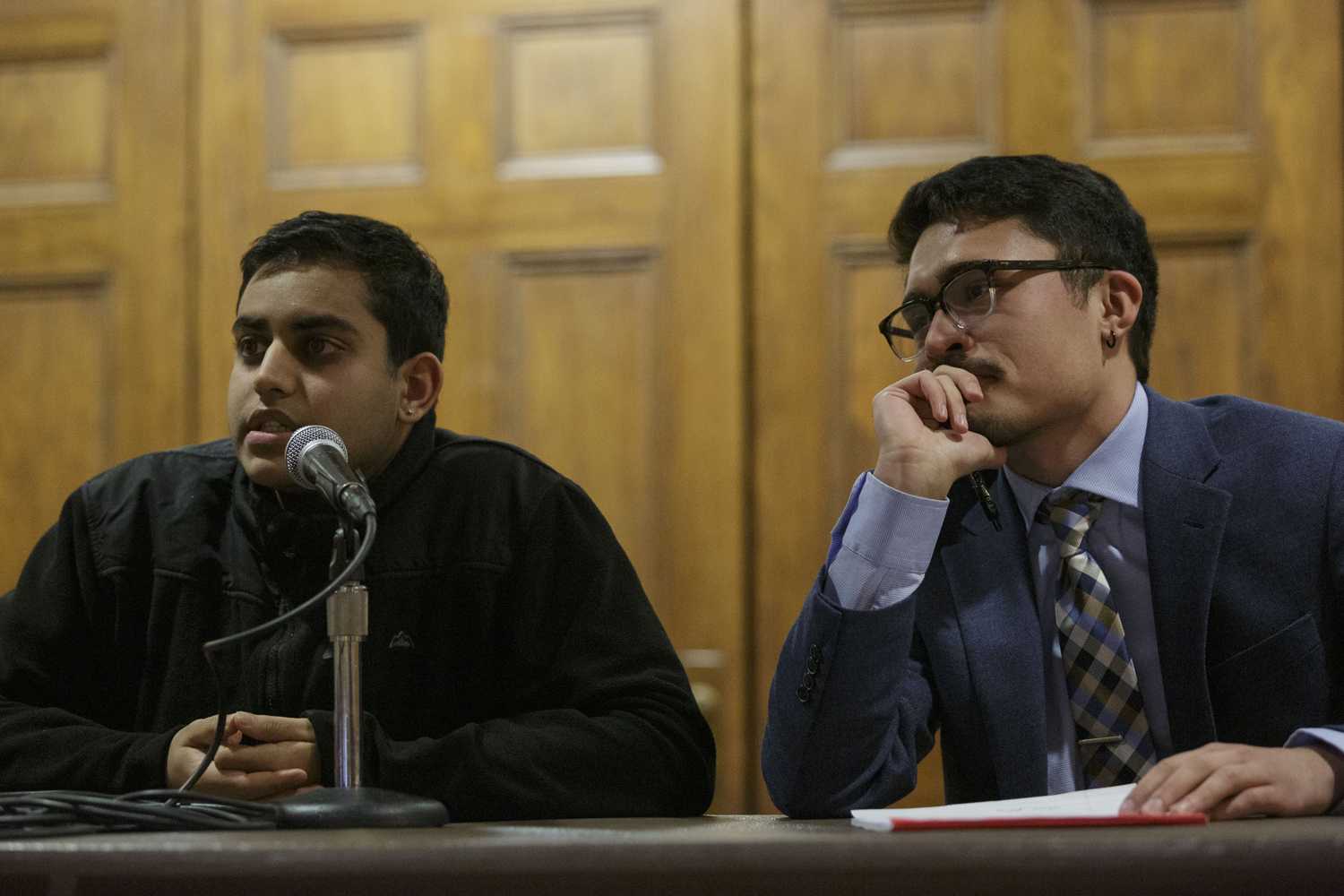SGB candidates debate key issues for presidency


SGB presidential candidates Ravi Gandhi (left) and Eric Macdangdang (right) disagree over the effectiveness of SGB’s current allocation system at Monday’s SGB presidential debate.
Across the room from several Pitt students playing ping-pong Monday night in Nordy’s Place, two presidential candidates for Student Government Board bounced ideas back and forth about key issues facing students.
Eric Macadangdang and Ravi Gandhi debated several central SGB issues, including the Allocations process, diversity and inclusion efforts, working with University administration and campus sustainability. Janine Faust, the editor-in-chief of The Pitt News, and Savannah Sowell, president of Pitt ACLU and the communications director of the Political Science Students Association, moderated the hour-long debate ahead of the Feb. 25 elections.
Gandhi is at the top of the ticket for YOUR Slate, running alongside board candidates Victoria Chuah, Victor So and Katie Richmond. Macadangdang leads the Voices Slate, running with board candidates Kathryn Fleisher, Ben King and Annalise Abraham. The Launch Slate, composed of current SGB members Tyler Viljaste and Cedric Humphrey does not have a presidential candidate.
The flashpoint of the debate was a discussion of the SGB allocations process, through which student organizations can receive a slice of the $900,000 offered every academic year from the Student Activities Fund.
Gandhi characterized the current process, regulated by SGB’s 23-page Allocations Manual, as a “bit of a mess.”
“What I’ve heard from a lot of people, and what I like to say, is I feel like Allocations is sometimes designed to push people away or drive people insane,” Gandhi, a sophomore mechanical and electrical engineering major, said. “It’s not a very approachable or easy process.”
Gandhi added that he has heard of some smaller student organizations utilizing fundraising to provide money for all of their operations, in an effort to avoid the allocations process altogether.
“I think Allocations should be there to support students,” Gandhi said. “I think the human approach in allocations has been removed and I want to bring that into it again.”
When asked after the debate for more information about problems with the current allocations process, Gandhi said he took issue with how some SAF money was being distributed to large student organizations, but declined to comment further, citing confidentiality. He also declined to go into details about what exactly he would change in the Allocations Manual, but said if elected, would survey the campus community to ask student organizations directly what works or doesn’t work for them.
Macadangdang, whose slate includes current SGB Allocations Committee Chair Ben King, pushed back against Gandhi’s remarks. He said it is important to have clearly defined guidelines about how SAF money can be handed to clubs.
“We have to think very clearly and responsibly about how every single person is putting money into a system, and we have to make sure what we’re putting that money to is going to benefit students,” Macadangdang, a junior urban studies and history & philosophy of science major, said.
Macadangdang also said he has heard more concerns about the allocations process with regard to the role of the Student Organization Resource Center, which handles financial tasks like fund disbursement and bank account management. Efforts are currently underway, he said, to incorporate outside bank accounts and utilize the money transfer app Venmo to make allocations easier for student organizations.
“There’s over 600 student organizations on campus. There’s two business managers in [SORC],” Macadangdang said. “They’re not much of a resource whenever there’s that much overworking and understaffing.”
The conversation on allocations highlighted differences in how Macadangdang and Gandhi think about the SGB presidency, and the board generally.
Gandhi said he viewed the presidential position as more of an advocate for student organizations on campus, vowing to use data-driven efforts to gauge students’ opinions about key issues. He cited as evidence the work underway in his current capacity as chair of SGB’s Diversity and Inclusion Committee, such as launching a public survey to solicit feedback about constructing an LGBTQ+ student center on campus and building unity among dozens of D&I student organizations.
“I want to shift Student Government away from us having our own initiatives and us doing our own work and meeting with administrators,” Gandhi said, “and shift that to us meeting with students, us meeting with student groups, uniting them, having a lot of collaboration events, working for them and doing more student advocacy.”
Macadangdang said he saw the role as more of a bridge between administration and student organizations, ensuring that students have a voice in changes that occur on campus. He mentioned his re-formation of the multi-organization Sexual Assault Prevention Coalition after the October release of a survey about sexual misconduct on campus and his proposal for a student seat on Pitt’s Board of Trustees as examples of this.
“I wanted students directly at the table for decisions that are directly affecting them,” Macadangdang said.
When asked what initiatives they would pursue first as president, Macadangdang said he would focus on continuing to expand mental health resources at the counseling center and Pitt’s affordability for students — two deeply personal issues for him.
“When I came to college, I was a depressed poor kid,” Macadangdang said. “Mental health is a crisis across all college campuses, and Pitt could really get ahead of the game if it chooses to invest in it.”
Macadangdang also lauded the Pitt Success Pell Match Program launched last year and the Panthers Forward debt relief offering, but said measures such as a tuition lock when first-year students begin at Pitt could provide further assistance.
“We have to keep on expanding this because there are still people struggling,” Macadangdang said. “Things such as a tuition lock … could institute the ease of mind of knowing how four years is going to look financially for you.”
Gandhi said he would instead want to focus his time more on the concerns that community members bring to him over pursuing his own initiatives.
“I think the president should be focused on the advocacy aspect,” Gandhi said. “Instead of coming with issues I have, or issues I want to solve, I want to focus on solving issues that people have.”
A previous version of this story said presidential candidate Ravi Gandhi is a junior at Pitt. He is a sophomore. The article has been updated to reflect this change. The Pitt News regrets this error.
Recent Posts
‘He’s off to a much faster and better start’: Republicans reflect the second Trump administration’s first two months
Since Inauguration Day Trump’s second term has caused division amongst young Americans. Despite these controversies,…
Who Asked? // Why do we accept bad treatment from people?
This installment of Who Asked? by staff writer Brynn Murawski attempts to untangle the complicated…
What, Like It’s Hard? // Lean on your people
Contributing editor Livia LaMarca talks about leaning on your support networks and gives advice on…
Note to Self // Hot Girl Summer
In the sixth edition of Note to Self, Morgan Arlia talks about how she is…
A Good Hill to Die On // Down to Date and Time
In the latest version of “A Good Hill to Die On,” staff writer Sierra O’Neil…
‘Dress for Success: Closet to Career’ alleviates the stress of building a professional wardrobe
As the end of the spring semester rapidly approaches, many Pitt students find themselves in…

